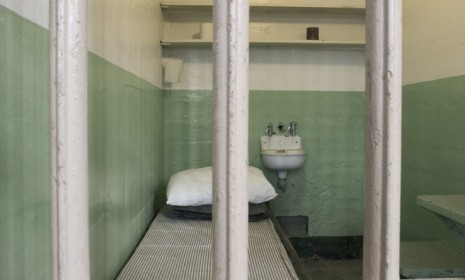The jail where every prisoner gets a flat-screen TV and private shower
In Norway's Halden prison, murderers, rapists, and pedophiles live in relative luxury, and the results are impressive. Would the U.S. ever pamper inmates this way?

A free daily email with the biggest news stories of the day – and the best features from TheWeek.com
You are now subscribed
Your newsletter sign-up was successful
Anyone who's been to a U.S. prison, or even seen one on TV, might be surprised by Norway's Halden maximum-security penitentiary. Opened in 2010 at a cost of about $280 million, the flagship of Norway's criminal justice system has won multiple awards for its minimalist modern design. If not for its tall, insurmountable concrete wall — tastefully hidden behind a mossy green birch forest — you might mistake it for a "Scandinavian boutique hotel," says Amelia Gentleman at Britain's The Guardian. Every murderer, rapist, and pedophile has his own room with a flat-screen TV, private shower and toilet, fridge, fluffy white towels, and a view of mountainous scenery through large, bar-free windows. The cost of maintaining prisoners at Halden costs about $500 per inmate per night. What are the Norwegians thinking? And does their remarkably "humane" prison system actually work?
Just how luxurious is this prison?
Let's just put it this way, says Truthdig, "If you're going to commit a jailable offense, do it in Norway." Prisoners are encouraged to spend almost all day outside of their well-apportioned cells — paid to, actually, about $9 a day. They mingle with college-trained guards and life-coach counselors, eat waffles and other foods delivered on white ceramic dishes, have constant access to fresh-brewed coffee, and can spend their time in couch-outfitted common areas, on the beautiful grounds, at classes or workshops, or even in the prison's recording studio.
The Week
Escape your echo chamber. Get the facts behind the news, plus analysis from multiple perspectives.

Sign up for The Week's Free Newsletters
From our morning news briefing to a weekly Good News Newsletter, get the best of The Week delivered directly to your inbox.
From our morning news briefing to a weekly Good News Newsletter, get the best of The Week delivered directly to your inbox.
What do the prisoners think?
Those who transferred from Norway's other prisons generally appreciate the luxury accommodations, even if some beef about the lack of access to illicit drugs. But it's not like the inmates are excited to be in the prison, says Gentleman. Though the hotel comparison is common, it's ultimately "a stupid one." Unlike a hotel, you can't leave Halden. As one prisoner tells her: "The real issue is freedom, which is taken away from you. That is the worst thing that can happen to you."
Do the accommodations help rehabilitate prisoners?
The prison governor reports few or no fights, and Halden certainly "doesn't feel like a place where you have to look over your shoulder," says Gentleman. Though Halden's full impact can't be measured yet, Norway has only 74.8 people imprisoned per 100,000 residents, versus 236 inmates per 100,000 in the U.S. and 140 per 100,000 in England and Wales. And only 20 percent of Norway's ex-cons commit repeat offenses within two years, versus 50 percent in Britain and 60 percent in the U.S.
A free daily email with the biggest news stories of the day – and the best features from TheWeek.com
Why does Norway pamper its convicts?
It's part of a broad philosophy. The maximum sentence in Norway is 21 years — no life sentences, and certainly no death sentences — and so the focus is on rehabilitating the prisoner into the type of ex-con you'd want as a neighbor. "If you stay in a box for a few years, then you are not a good person when you come out," says Halden governor Are Høidal. "It is this building that makes softer people."
What about Anders Breivik?
Norway isn't used to dealing with mass killers, so it isn't clear what will happen to Breivik, assuming he's convicted for last year's massacre of 77 people at a government youth camp. Even though Halden is one of the few maximum security prisons in Norway, he'll probably be sent back to Ila, the former Nazi concentration camp where he's currently being held. But Breivik won't weaken Norway's commitment to humane prisons — at least not yet, says Høidal. "If [such a tragedy] happens again, then maybe we will have another discussion about the system."
Should the rest of the world adopt Norway's attitude?
Perhaps, but it's unlikely countries like Britain and the U.S. will follow suit, says Gentleman. Norway has a more generous welfare system, a lower crime rate, and a unique understanding of justice. And then there's the cost. Maybe one day the U.S. "will progress towards an understanding that spending more money rehabilitating those convicted of crimes and expending more compassion will yield a more stable and just society for everyone," says Alonzo T. Calm at MetaFilter. But for now, Americans are known for their "uniform and resounding cry for blood."
Sources: Justice Department, Guardian, MetaFilter, Prison Policy [PDF], Truthdig
-
 Political cartoons for February 15
Political cartoons for February 15Cartoons Sunday's political cartoons include political ventriloquism, Europe in the middle, and more
-
 The broken water companies failing England and Wales
The broken water companies failing England and WalesExplainer With rising bills, deteriorating river health and a lack of investment, regulators face an uphill battle to stabilise the industry
-
 A thrilling foodie city in northern Japan
A thrilling foodie city in northern JapanThe Week Recommends The food scene here is ‘unspoilt’ and ‘fun’